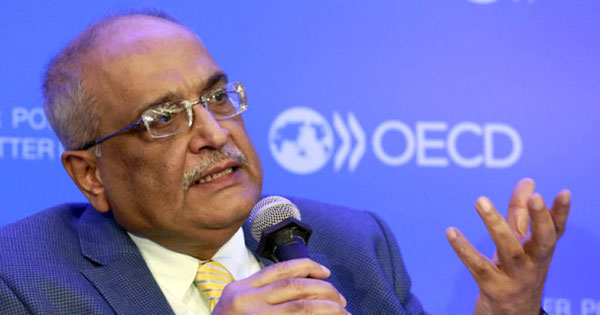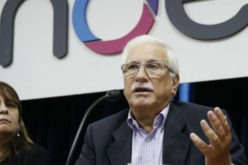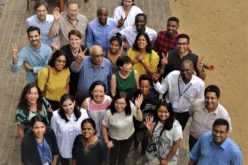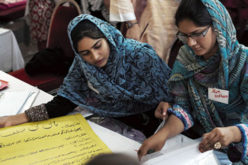Time to ‘call EU’s bluff’ on paradigm shift: Debapriya Bhattacharya
The interview appeared on Devex website on Wednesday, 27 May 2015.
INSIDE DEVELOPMENT
POST-2015 DEVELOPMENT AGENDA

Debapriya Bhattacharya, chair of the Southern Voice on Post-MDG International Development Goals. Photo by: Andrew Wheeler / OECD / CC BY-NC-ND
Less than two months away from the third International Conference on Financing for Development in Addis Ababa, Ethiopia, many within the global development community are wondering whether top donors will truly step up to the challenge of financing the future sustainable development goals.
Debapriya Bhattacharya, chair of the Southern Voice on Post-MDG International Development Goals, a network of 48 think tanks from South Asia, Africa and Latin America, believes the European Union is one such donor that can “lead from the front” alongside the Organization for Economic Cooperation and Development on initiatives like providing technical assistance for better taxation in developing countries.
However, while this and other sources of development finance like foreign direct investment may seem like “low-hanging fruit,” he complained that donors are still focusing too much on doling out official development assistance, instead of helping to mobilize resources.
Below are a few highlights from our conversation with Bhattacharya — on the sidelines of thelaunch of the European Report on Development 2015 in Brussels, Belgium — on how to move beyond traditional aid, and why the EU needs to walk the talk on supporting U.N. Secretary-General Ban Ki-moon’s “paradigm shift” on financing for development:
When we sat down together two years ago, you said that the EU needs to get its house in order. Is there any change to your key message to European actors in the run-up to Addis?
Two years back, I said that the biggest help for the low-income countries was for the EU to get its house in order. By that, I meant that at the time, [many of the] EU economies and member states were in a state of economic crisis.
As we know, there has been a very [faltering] recovery. There have been ups and downs; there have been extreme cases like Greece and others. … So that observation still remains, because if the EU doesn’t grow itself, then it cannot help others to grow. It means that there will not be enough market demand for goods. And it will also mean there would not be enough income for the taxpayers to pay for the ODA budget. So I think that point is quite still very valid.
But, in between, what has also happened is that EU’s aid policy — or, for that matter, trade policy — has also progressed up to a point. We have seen that the rules of origin issue has been improved so that countries — like my own country Bangladesh, other low-income countries and least-developed countries — can export goods.
And although it had been growing in terms of dispersing aid to LDCs, last year it went down in real terms, and while colleagues at the OECD promise that it will go up in the coming years, that is really the empirical issue. So I would say the picture had been pretty mixed and we will have to wait and see.
And regarding financing for development?
In terms of FfD, what is important at this moment is that even if we have a good idea, a universal transformative agenda and a credible work plan, what really matters is the political will and leadership.
Unfortunately, we are yet to see leadership on the part of the global development community. The EU can step in and provide that leadership, particularly by bringing together developed countries and the OECD-DAC members. That would be a great service and the EU has all the potential to do that.
So what are the obstacles then to one or other group — say the EU — taking this FfD process by the scruff of the neck? What hurdles do they need to jump over?
See more stories on Financing for Development:
● Financing for development and country ownership
● Toward Addis and a long, hot summer ahead
● Changed landscape requires new ways of paying for development
● Financing for development: What is at stake?
● Looking to Addis: Financing future development goals
One issue, of course, is the traditional issue of official development assistance. But in between we have a new set of issues relating to public finance, namely domestic public finance; essentially, for the universal agenda to work, we need to plug all the leakages in country. But the country governments themselves cannot do it; they have to deal through a cooperative relationship with other countries, particularly when it comes to illicit financial outflows, the transfer pricing of the multinationals, profit-based erosion, profit transfer issues, and so on.
These issues are there because there are tax havens. There are banking systems in the European Union which still have very opaque policies; they do not do full disclosures. All the ill-gotten monies are being held there, so will they really have to reach an international tax agreement that will help us to do all the things necessary to get our resources back. And only then can we put it at the service of the poor people in their own countries.
But in that sense you’re asking Europe to step up and lead from the front?
I think Europe can lead from the front, particularly the European Union, along with the OECD, where the discussion has been quite mature. I also think improving the quality of foreign aid is important. Discussions are ongoing, but the issue is whether the discussions will have matured enough to put into an international agreement in Addis.
Now, we’ve talked today about a number of different categories of finance that will be mobilized. What role will private capital play in the new financing for development landscape and how should the EU — or others — seek to foment a genuinely supportive investment climate?
Yes, the private sector has to play a lead role in the post-2015 agenda, no doubt about that — everybody would agree with that. But, at the end of the day, the issue is that private finance will be motivated by the rate of return.
However, we know that the yield rates in developing countries are much higher than the surplus, which has been locked into low yielding bonds, government bonds, across the Atlantic and elsewhere. How do you really create the real incentive, which makes people go for much more low yielding secured investment, than high risk, high yield ones? This is where the EU can come in and bridge that, [through] some kind of incentivized private sector engagement by underwriting some of the structural risks involved. And also in terms of thinking about a pro-fiscal system, which will encourage these investors to go and invest in low income countries. And then to make sure that, even when they go into the low-income countries, they will be investing in manufacturing or high-end services, not in extractive industries as is the case of Africa.
So this is a value added: It will be a value addition to the country recipient, and also to those who are investors. So we’re looking for that kind of matchmaking role from the EU, through all the types of instruments that it has at its disposal.
And what can the EU do to keep domestic public revenues on an upward trajectory in developing countries?
If you look at the aid portfolio of the EU, and particularly the technical assistance portfolio, you will see very little money has gone in strengthening the revenue capacities of the low-income countries.
It’s been more about budget support?
Exactly, and even when the technical assistance has gone in, it has gone into various areas such as health and education — which I am not undermining, but it has not focused the attention toward strengthening the regulatory framework, the capacity of the revenue boards and others in country.
So I would think that the EU in the future would also — in a very targeted way — allocate more resources for technical assistance toward building the capacity of tax administrations.
And the potential there is huge, isn’t it? Do you see it as a kind of final frontier for resource mobilization?
This is a relatively low-hanging fruit, not only because for the situation in the low-income countries, but also because of the situation in the developed countries. Many of the developed countries in Europe, and the big ones in particular, had been complaining about their own citizens not paying adequate taxes and evading taxes by keeping money elsewhere. So I think there is a compatibility of interest. But this will mean we are broadening the frontier of intervention from the economy of the low-income countries to the systemic concerns. You see, this is the qualitative change we’ll have to ensure becomes irreversible. The future relationship under a universal post-2015 agenda is not about giving money to low-income country governments, it is about bringing about a change in the system. The efficiency gains from a change in the system will be much more important for the low-income countries than a couple of dollars here and there.
And what, in your view, are the key obstacles to a consensus in Addis? What can the development community do in real terms between now and July to set the conference up for success?
I think one thing they must realize, reflect upon and then advocate for is that financing for development is not about only aid. Aid is important, particularly in a conflict-ridden country or a fragile state, but there is a large group of countries — developing countries, low-income countries — that have moved on since the last time we discussed these things, over the last five to 10 years.
So it is important that we change the mix of the financing and understand that asking for FfD is not about taxing the citizens in developed countries to generate more resources for the rich people of any other poor country, where it might get squandered away. What is critical here is to have more information, more transparency, so that there is a mutual accountability in the process. We still now do not have that mutual accountability mechanism set up in the world.
U.N. Secretary-General Ban Ki-moon recently called for a “paradigm shift” in this regard. Do you think that we will see this in Addis and at the U.N. General Assembly in New York in September, or do think that it’s going to become an exercise in lowest common denominators in terms of finding a consensus?
You see, many organizations like ours — Southern Voice — we’re asking the question: What is the value addition we will find in Addis vis-a-vis Monterey, Accra, Busan and all these places?
Earlier, developed countries talked about the developing countries needing to have a paradigm shift, a mindset change, to learn how to deal with their own resources and be independent and responsible for their own future.
I think they have learned to do that. Unfortunately, the developed countries still have not changed. All discussions end up talking about ODA, which is a tragedy. Those who are asking for change in mindset are themselves stuck with a certain mindset. I do not see any discussion beyond aid over here, whereas in countries like mine, we are talking about trade, we are talking about remittances, we are talking about FDI, we are talking about how to get access to technology. So I think those are the new issues and I call upon my colleagues in the developed countries to really have a change in mindset.
And moving beyond aid would, of course, include private sector finance and other innovative forms of finance. We talked about remittances earlier, but we’ve also heard a lot about crowdfunding as well. What’s your take on that?
Innovative finance, at the end of the day, will need global collaboration because most concerns cross-border activities: whether a climate fund or a financial transaction tax. So again, it has to come at a higher level of change in mindset. I see the movement from a very eighth century discussion to a multiple financial instrument centric discussion leading to systemic change. This will be the way forward to approaching innovative finances and that is the direction we will have to move into.
I take your point that there’s a lot of attention paid to ODA, but of course the very nature and definition of ODA could soon be set to change to include lots of different things, including concessional loans and so on. Is that a game changer?
The most important thing that is changing is that its role as a share in the total financial flow is going down. You see, even if tomorrow, or in the next five years developed countries fulfil their much awaited promise of 0.7 percent of [gross national income], it will still be a minuscule part of the overall financial flow — so we should not really get over excited about it. The real issue is how, in the future, we strategically use that very precious grant aid in a particular way in order to mobilize other resources. It is the catalytic role of ODA that will become much more important in future.
Aid is important, but it is time we looked beyond aid. In order to finance the future we would have to look for more blended finance, where aid will be used as a catalyst. In order to make good use of all this we’ll have to have domestic reforms, starting from strong institutions, improved governance, access to justice, all those things. And last but not the least, the world has to change as well. The way they used to do business, the way they used to structure the financial flows, has to change as well along with these issues.
So yours is a call for a sea change?
It’s what the EU calls a paradigm shift. It is time to call their bluff. If they really mean paradigm shift, let’s have it. If not, we’re going to expose it.
And will actors like the EU really put their cards on the table in Addis?
Yes, I think the global community is much more aware than before, and I think developed countries are also looking for win-win solutions. … There are so many global threats at this moment, in the security area, in terms of health issues such as Ebola and others, that it really is time to come together.
2,085 total views, 1 views today










